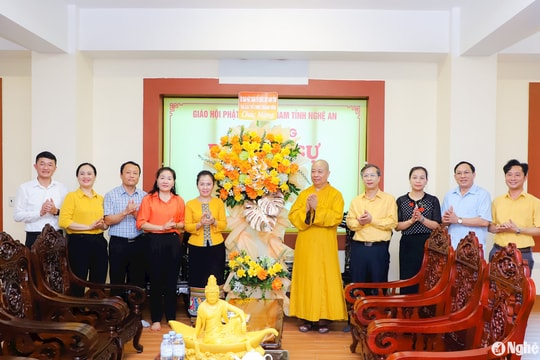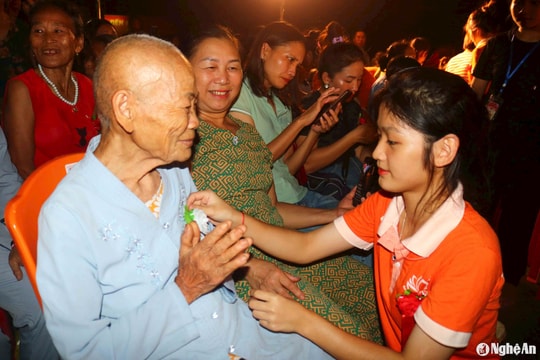What date does Vu Lan Festival 2024 fall on? Origin, meaning and important rituals
Vu Lan Festival is an occasion for us to repay our parents for raising us and giving birth to us. What day is Vu Lan Festival? Let's learn about the origin and meaning of Vu Lan Festival.
- What date is Vu Lan Festival 2024?
- Origin and meaning of Vu Lan festival
- About the origin of Vu Lan festival
- About the meaning of Vu Lan festival
- Important rituals on Vu Lan festival
- Prepare the offerings for Vu Lan festival
- Making a flower pin on the lapel for Vu Lan festival
- Go release flower lanterns
- Details of the offering tray on Vu Lan festival
- Prepare the Vu Lan offering tray
- Vu Lan worship order
- Prepare prayers for Vu Lan festival to show filial piety
- What to do and what to avoid on Vu Lan festival
- Things to do on Vu Lan festival
- Things to avoid on Vu Lan festival
- Vu Lan worship rituals past and present
What date is Vu Lan Festival 2024?
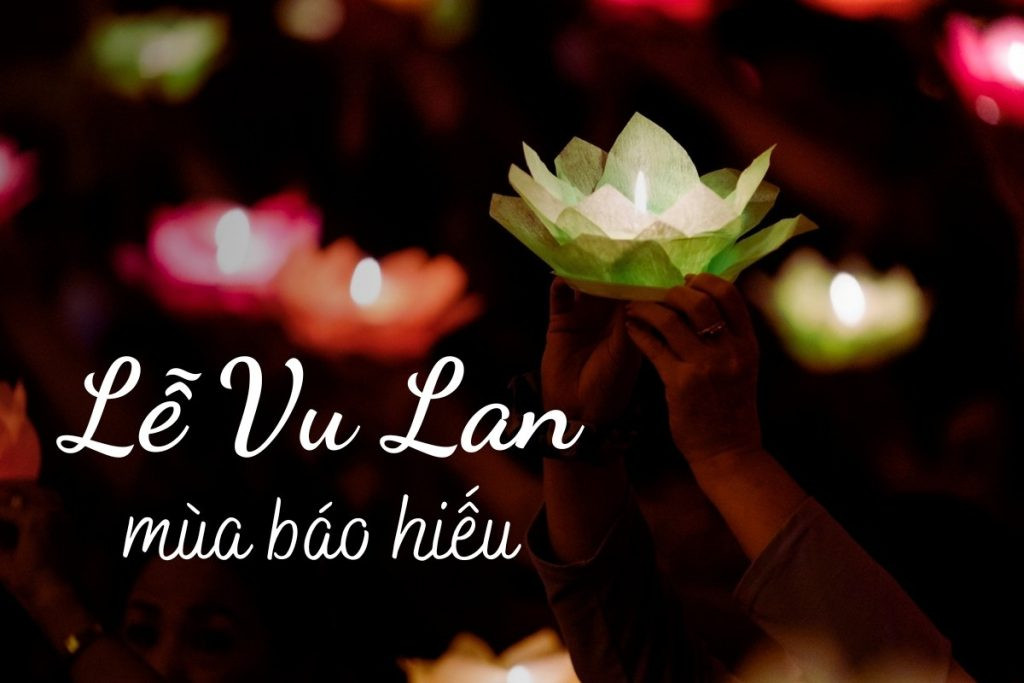
Vu Lan Festival, also known as Parents' Day or Yulan Festival, falls on the 15th day of the 7th lunar month every year, coinciding with the Ghost Festival and All Souls' Day. This is an important holiday in Buddhism (Mahayana Mahayana) and in East Asian customs and culture.
Taking place on the full moon day of the 7th lunar month (July 15th) every year. According to the solar calendar, Vu Lan festival usually falls in mid to late August, or early September every year, specifically:
Vu Lan Festival 2022 falls on Friday, August 12th.
Vu Lan Festival 2023 falls on Wednesday, August 30th.
Vu Lan Festival 2024 falls on Sunday, August 18th.
Vu Lan Festival 2025 falls on Saturday, September 6th.
Origin and meaning of Vu Lan festival
About the origin of Vu Lan festival
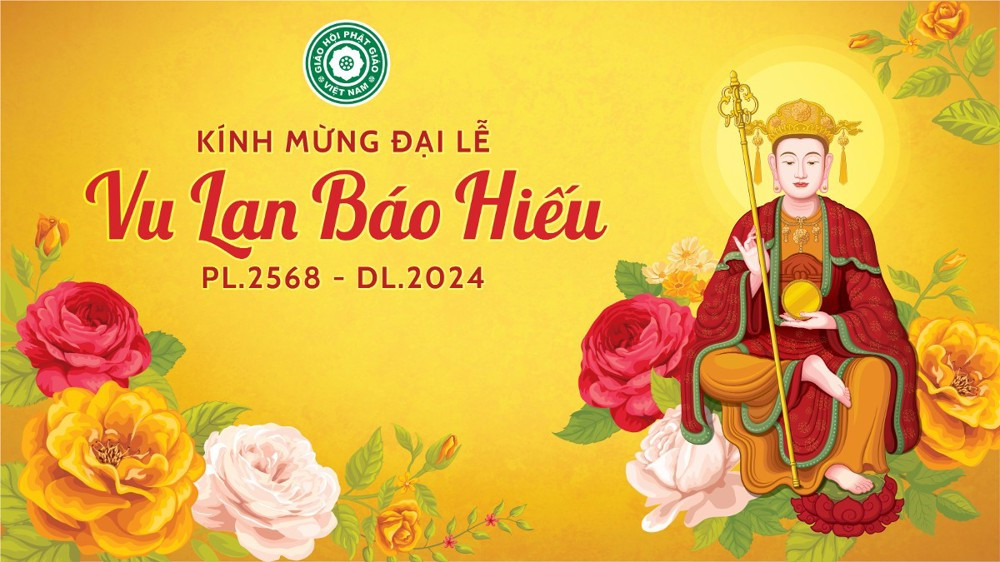
Vu Lan Festival originated from the story of the Venerable Maudgalyayana saving his mother from the realm of hungry ghosts. He was one of the two most respected disciples of Shakyamuni Buddha. After attaining enlightenment, he used his supernatural powers to know that his mother, Thanh De, was suffering from the realm of hungry ghosts in hell because of the many evil deeds he had committed during his lifetime.
Out of filial piety, he brought food to his mother to ease her hunger. However, as a result of his evil karma, the food suddenly turned into red fire as soon as it reached her mouth.
Too heartbroken by that situation, Maudgalyayana returned to see the Buddha hoping to find a way to save his mother. The Buddha taught that: “No matter how great a person’s supernatural powers are, they are not enough to save their mother. Only by joining forces with the monks of the ten directions and dedicating merit to eliminate evil karma can they hope to be liberated. And the fifteenth day of the seventh month is a suitable day to invite the monks, so prepare the rituals for that day.”
Following the Buddha's teachings, Maudgalyayana freed his mother from the realm of hungry ghosts. According to the Ullambana Sutra, the Buddha also taught: "Living beings who want to show filial piety to their parents should also follow this method." From then on, the Ullambana festival was born and has existed until today.
About the meaning of Vu Lan festival
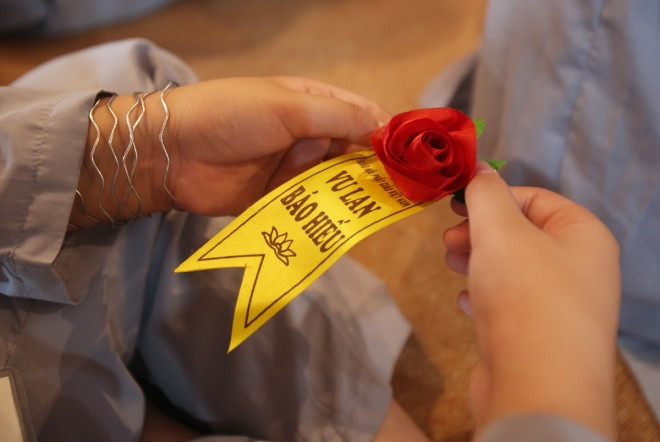
When mentioning Vu Lan, many people immediately know that the meaning of this holiday is to show gratitude to ancestors, grandparents, and parents (of this life and previous lives). Everyone knows that parents sacrifice a lot for their children, spending a lot of effort to raise us to be good people without expecting anything in return.
Filial piety here is towards parents - those who have given birth and raised us in this life and many other lives. Buddhist beliefs always see people in the relationship of cause and effect, reincarnation. This means we must extend our filial piety to all living beings.
The touching images during the Vu Lan Festival are the roses pinned on the lapel. Regardless of age or gender, the participants respectfully receive the roses pinned on their lapel. The red flower symbolizes the mother's still life, and the white rose is to commemorate the deceased mother. The act of pinning the noble flower on the lapel symbolizes the best feelings, the complete filial piety that children send to their parents.
For Vietnamese people, filial piety always comes first, reminding us of those great sacrifices. The ancient proverbs and idioms always teach us that:
"When you eat the fruit, remember the person who planted the tree."
"Birds have nests, people have ancestors."
"Drink water remember the source".
"Father's merit is like Thai Son mountain, mother's love is like water flowing from the source."
...
No matter what, we must remember to keep our filial piety, respect and love our ancestors and parents with all our heart.
The birth of Vu Lan festival is an occasion to remind the younger generations of those immense gratitude. At the same time, it helps us approach the humane educational meanings of Buddhist culture: "KINDNESS - COMPASSION - JOY - FORGIVENESS", "Selflessness, altruism".
Important rituals on Vu Lan festival
In Buddhist beliefs and Vietnamese customs, the annual Vu Lan festival takes place with many solemn rituals, from offerings at home to meaningful activities at the temple:
Prepare the offerings for Vu Lan festival
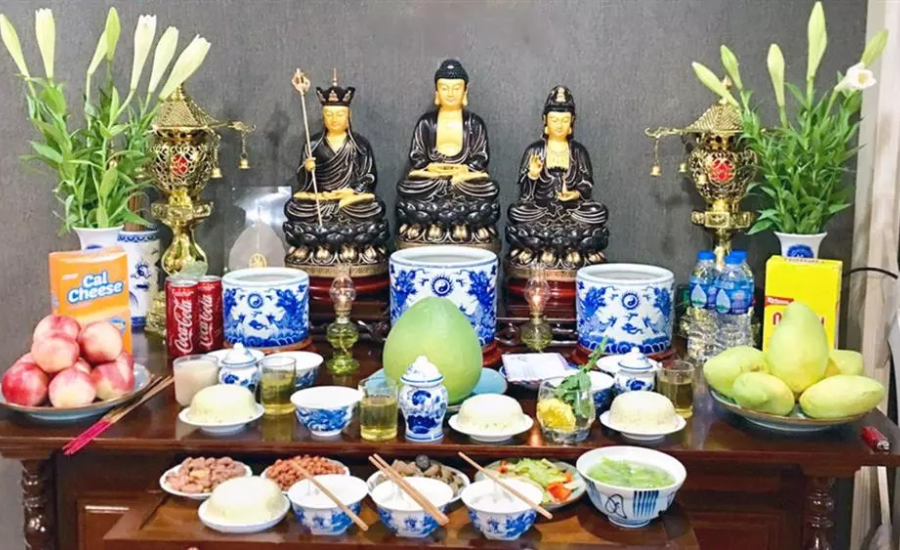
Vu Lan worshiping ceremony in each house is usually performed in the following order: worshiping Buddha, gods, ancestors, and finally offering food. Each worshiping ceremony has its own meaning and requires the preparation of appropriate offerings:
Offering to Buddha: The offering tray to Buddha usually has vegetarian food, five fruits and a ritual of reading prayers to pray for merit and to dispel karma for deceased ancestors.
Offerings to the gods: Offerings to the gods usually include: sticky rice, a whole boiled chicken, banh chung, tea, wine, fruit, fresh flowers, etc., along with prayers asking the gods to bless and protect the family with health and peace.
Ancestor worship: The ancestor worship tray is usually solemnly prepared during Vu Lan festival with vegetarian or non-vegetarian food, votive paper money, etc. The ancestor worship ceremony aims to show respect, hoping that the deceased ancestors have a full and prosperous life like in the world.
Offering to sentient beings: Vu Lan Festival coincides with the 15th day of the 7th lunar month, so it is often combined with offering to sentient beings, also known as alms-giving, with the meaning of helping wandering souls without a place to burn incense to enjoy blessings. The offering tray for the 15th day of the 7th lunar month for sentient beings is placed separately outdoors with offerings including: thin porridge, rock sugar, salt, rice, fruits, candy, popcorn, incense, lamps, paper clothes, gold coins, etc.
Making "Rose on lapel" on Vu Lan festival
During Vu Lan festival, pagodas in Vietnam often hold the “Rose Pinning” ceremony for Buddhists. Those who still have parents will pin a red rose on their lapel and those who have lost their parents will pin a white rose.
This ritual was initiated by Zen Master Thich Nhat Hanh through his book in 1962. The image of a rose pinned on the lapel has since become a symbol of Vu Lan season among Buddhists, reminding everyone of gratitude and filial piety.
Go release flower lanterns
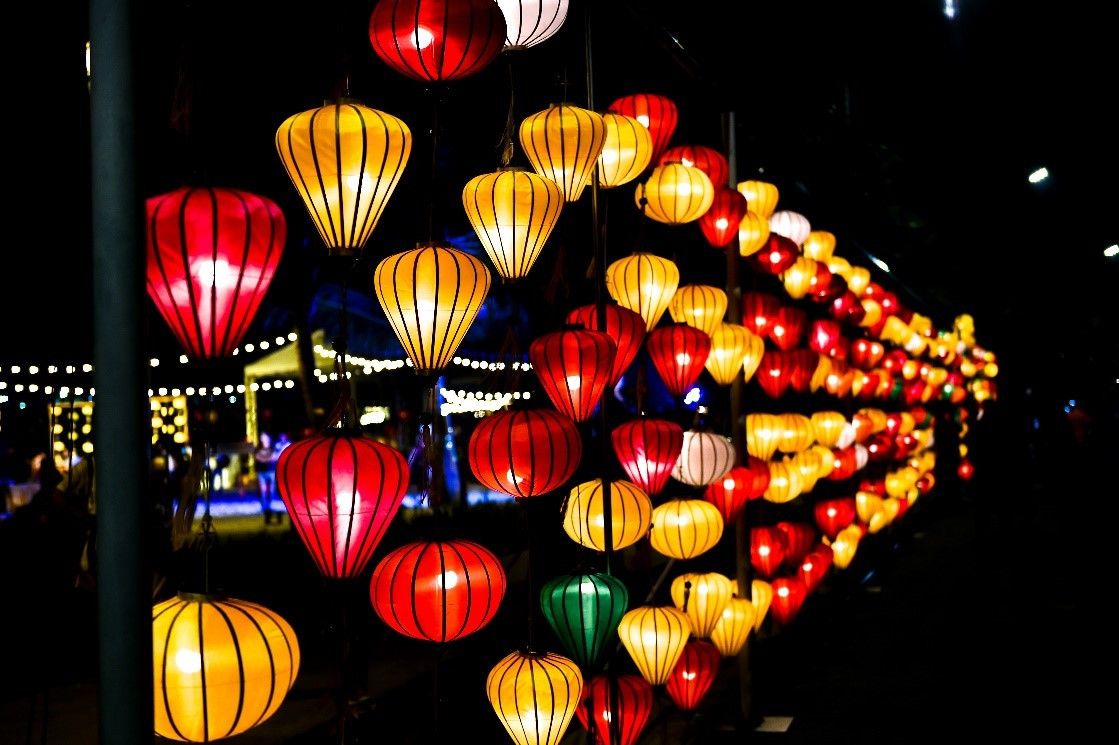
For a long time, releasing flower lanterns has become a traditional ritual on Vu Lan day. The ritual is also an indispensable part of Buddhism, with the meaning of praying for the deceased. Each flower lantern is meticulously designed with a candle lit before being released into the river, accompanied by good thoughts and prayers for peace.
Details of the offering tray on Vu Lan festival
Prepare the Vu Lan offering tray
When worshiping Vu Lan, we should put all our heart into it to show our sincerity, without focusing too much on "high trays and full dishes". Although each family has a different way of worshiping, usually, offerings for Vu Lan include:
thin porridge
Rice.
Salt.
White rice.
Water.
Soup.
Sticky rice and sweet soups.
Boiled sweet potatoes and taro.
Popcorn.
Fruit.
Cake.
Betel and areca nuts.
Cigarette.
floral scent
Paper clothes.
Vu Lan worship order
And the order of Vu Lan offerings includes: offerings to Buddha, offerings to gods, offerings to ancestors, and finally offerings to living beings.
For Buddhist worship
You prepare a vegetarian meal or a five-fruit tray to worship Buddha. When worshiping, you should read a Vu Lan Sutra (Vu Lan Bon Sutra) to understand this day and pray for the merits of your past loved ones to be resurrected soon.
For the worship of the gods
A typical offering to the gods would include a whole boiled chicken or sticky rice. You could also offer banh chung (sticky rice cake) with its leaves peeled off, a gourd of wine, fruit, fresh flowers, and tea.
For ancestral worship
When worshiping your ancestors, you should have a tray of food, salty or vegetarian depending on whether you and your grandparents eat vegetarian or non-vegetarian food. In addition, you should offer gold and silver coins and objects to the deceased. With the hope that the dead will have a full and prosperous life like in the living world, symbolized as:
Clothes.
Shoes.
Robe.
Jewelry,...
For the offering ceremony
You should worship the living beings outside, not together with the family altar. When worshiping, you burn votive paper money, clothes, then stand and scatter rice and salt in the 5 directions. The offering tray usually includes:
Salt and rice.
Fruit.
12 bowls of porridge.
12 rock sugar cubes.
Clothes.
Popcorn.
Confectionery.
Gold.
Water.
Incense.
Candle.
Boiled sweet potatoes.
Boiled corn.
Boiled cassava.
Sugarcane.
Prepare prayers for Vu Lan festival to show filial piety
Namo Amitabha Buddha (3 times)
I bow to the nine directions of heaven, the ten directions of Buddhas, the Buddhas of the ten directions.
I respectfully bow to Ksitigarbha Bodhisattva and Maudgalyayana Venerable.
Today is the 15th day of the seventh lunar month…….
We, the believers, are…..
Residing at…….
Sincerely prepare incense, flowers, offerings and other offerings, and place them before the altar.
We respectfully pay homage to the Bodhisattva Ksitigarbha and the Venerable Maudgalyayana.
We respectfully invite you, the Golden Year God, the Great Kings of this area, the Local God of the Earth, the Kitchen God of this area, and all the deities who govern this area.
I humbly ask you to come down to judge and witness.
Today is Vu Lan festival, the day the deceased are pardoned. We are grateful to the Triple Gem, Buddha and heaven for their protection, the gods for their protection, and we do not know how to repay this great merit.
Therefore, we respectfully offer this humble offering, expressing our sincerity and wishing to accept it. Bless us and our family with good health, peace for the young and old, wholeheartedly following the righteous path, prosperity and family prosperity.
I sincerely apologize and ask for your witness!
Namo Amitabha Buddha (3 times).
What to do and what to avoid on Vu Lan festival
Vu Lan Festival is not only an important day in Buddhism with the meaning of remembering the merits of parents and ancestors, but also coincides with the 15th day of the 7th lunar month - the day of forgiveness for the dead. Therefore, according to folk beliefs, people need to follow some rules about what to do and what not to do on this occasion.
Things to do on Vu Lan festival
To properly carry out the spirit of gratitude and filial piety of Vu Lan festival, you should do the following to have a meaningful holiday season:
Visit, offer flowers, and burn incense at the graves of grandparents and ancestors to show gratitude and remember one's roots.
Be vegetarian, do good deeds, help the needy and unfortunate to dedicate merit to parents.
Go to the temple to pray for peace, participate in Vu Lan Festival activities and improve your knowledge of Buddhism.
Visit and care for your parents and grandparents and give them meaningful gifts. This is the most practical way to show your love and filial piety, bringing joy to your grandparents and parents.
Above all, Vu Lan festival is an occasion to review traditional values and filial piety. Therefore, let us live and work in the spirit of compassion, kindness and respect for everyone around us.
Things to avoid on Vu Lan festival
According to folk beliefs, the seventh lunar month is considered the month of wandering souls when the souls in hell return to the earth. Therefore, during the seventh month, including Vu Lan festival, people often tell each other to avoid the following things:
Limit shopping.
Avoid going out at night.
Do not pluck leg hair.
Do not dry clothes outside in the afternoon and evening.
Do not bathe or swim in rivers or lakes.
Avoid opening a new store, building a house, or getting married.
Do not kill to avoid illness and misfortune.
Do not quarrel or do bad things.
Note: The above concepts belong to folk beliefs and may vary by region and in each person's beliefs.
Vu Lan worship rituals past and present
Depending on each family's conditions, Vu Lan festival can basically have three offerings including worshiping Buddha, worshiping ancestors and worshiping sentient beings.
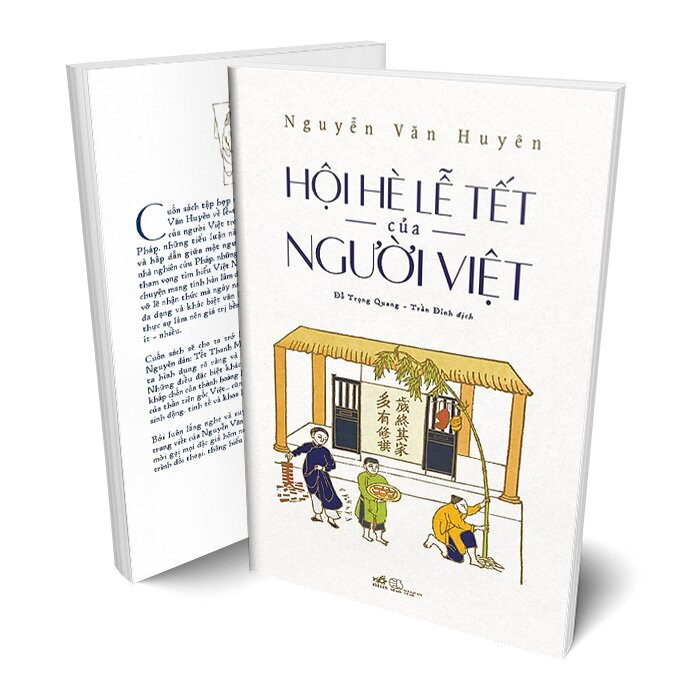
In the book Vietnamese Festivals, Professor, Doctor, historian Nguyen Van Huyen describes the full moon worship rituals of the Vietnamese in the early 20th century as not much different from today.
Families display clothes, belongings, and paper “gold and silver bars” on the ancestral altar, next to the ancestral offering tray. Families who worship Buddha offer vegetarian food, fruits, and other vegetarian foods.
In the evening or after dusk, after worshiping their ancestors, families place offerings on the altar to the abandoned souls, also known as ghosts according to folk beliefs.
The offering tray includes thin porridge, popcorn, rice popcorn, sweet potatoes, boiled corn, candy, fruit, clothes for sentient beings and indispensable rice, salt, a cup of wine or a small bottle of white wine.
In the past, thin porridge was poured into funnels made of banyan leaves, placed on the offering tray, or placed at the roots of trees on the street or in temples.
Researcher Phan Cam Thuong analyzed that in the 7th lunar month, family ceremonies are often the Buddhist Mong Son Thi Thuc altar offerings. At village temples, people often read Nguyen Du's "Eulogy for the Ten Kinds of Living Beings," read in 5 tones: metal, wood, water, fire, and earth.
In addition, during Vu Lan festival, when coming to the temple, Buddhists will be given a rose to pin on their shirt. Red symbolizes those who still have their mother and white symbolizes those who have lost their mother.
Those who are lucky enough to wear a red rose on their chest are reminded to try their best to be obedient, respectful, and polite to their parents. Those who wear a white rose will see it as a reminder to never forget their parents' kindness, and at the same time maintain family traditions and harmony among siblings.
Nowadays, Vu Lan festival is understood with a broader meaning - calling for social awareness of Buddha's spirit of gratitude, encouraging people to be grateful, to repay the four sources of grace. That is the grace of parents, teachers, sentient beings and the Fatherland - the predecessors who built the country, the heroic martyrs.

